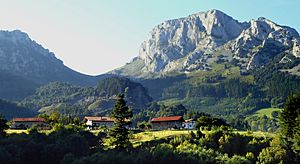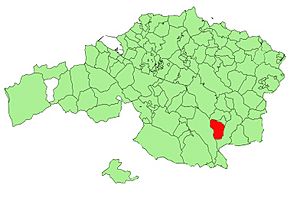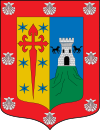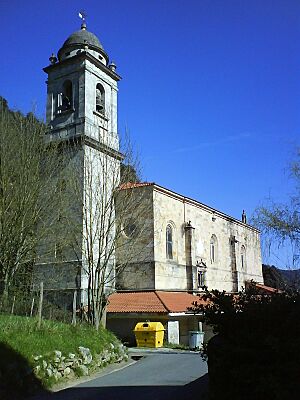Mañaria facts for kids
Mañaria is a small, charming town in the Basque Country of northern Spain. It's known as an "elizate," which is a special type of old town in the Basque region. Mañaria is located in the province of Biscay. It's part of an area called Durangaldea. In 2018, about 519 people lived there. The town's name is the same in both Basque and Spanish.
Quick facts for kids
Mañaria
|
|||
|---|---|---|---|
 |
|||
|
|||

Location of Mañaria in Biscay.
|
|||
| Country | |||
| Autonomous community | |||
| Province | Biscay | ||
| Comarca | Durangaldea | ||
| Area | |||
| • Total | 17.73 km2 (6.85 sq mi) | ||
| Elevation | 259 m (850 ft) | ||
| Population | |||
| • Total | 519 | ||
| • Density | 29.27/km2 (75.82/sq mi) | ||
| Demonym(s) | Mañaritarra | ||
| Time zone | UTC+1 (CET) | ||
| • Summer (DST) | UTC+2 (CEST) | ||
| Postal code |
48212
|
||
Contents
Mañaria's Past
Like many old "elizates," not much is known about how Mañaria first started. But we do know that people lived here a very long time ago. Scientists have found ancient tools and remains from the Stone Age in local caves. They even found a special vase from the 7th century!
In the 18th century, a new Royal Road was built. This road connected the city of Vitoria-Gasteiz to the coast. It passed right through Mañaria. This made the town an important center for the area.
A Time of Growth
From the mid-18th century through the 19th century, Mañaria became very successful. This was because of its quarries. Quarries are places where stone is dug out of the ground. The town used this success to build many new things. They made the church bigger. They also built a school, a Basque pelota court, a clock tower, and a cemetery.
Where is Mañaria?
Mañaria is located in the southeastern part of the province of Biscay. This area is in northern Spain. The town is surrounded by other municipalities. To the north, it borders Izurtza and Durango. To the west, it borders Dima. To the east and south, it borders Abadiño.
Mountains and Rivers
Mañaria sits in a beautiful valley. The Mañaria River flows through this valley. The town is surrounded by impressive mountains. The Mugarra and Untxillaitz mountains are two of the most famous. Other important mountains nearby include Arrietabaso and Saibi.
A road called BI-623 goes through the town. It connects Durango with Vitoria-Gasteiz. A large part of Mañaria, over 70%, is inside the Urkiola Natural Park. This park is a protected area of natural beauty.
Waterways of Mañaria
The valley where Mañaria is located was formed by the Mañaria River. This river starts in the hills of the surrounding mountains. The Mañaria River eventually flows into the larger Ibaizabal river.
Mañaria's Economy
The main ways people make a living in Mañaria are through mining and industry.
Digging for Resources
The most important economic activity in Mañaria is mining. People dig for materials like limestone and marble in quarries. These stones are valuable resources. There are also some small farming activities in the area.
Local Industries
Many industries in Mañaria focus on working with metals. These factories are mostly found in the deeper parts of the valley. They transform raw metals into useful products.
Services and Shops
There are not many shops or services in Mañaria itself. This is because bigger cities are very close by. Most people go to places like Durango or Bilbao for their shopping and services.
Getting Around Mañaria
Most transportation in Mañaria relies on roads. The main road is the BI-623. This road connects the town to Durango, which is about 5 kilometers away. Durango is the main town in the Durangaldea area.
If you go south on the same road, you can reach Urkiola. From there, you can travel to Otxandio, Dima, and the province of Álava. In Durango, the BI-623 connects to bigger roads. These include the National Road N-634 and the highway AP-8. These roads can take you to major cities like Bilbao and Donostia-San Sebastián.
See also
 In Spanish: Mañaria para niños
In Spanish: Mañaria para niños
 | James Van Der Zee |
 | Alma Thomas |
 | Ellis Wilson |
 | Margaret Taylor-Burroughs |




